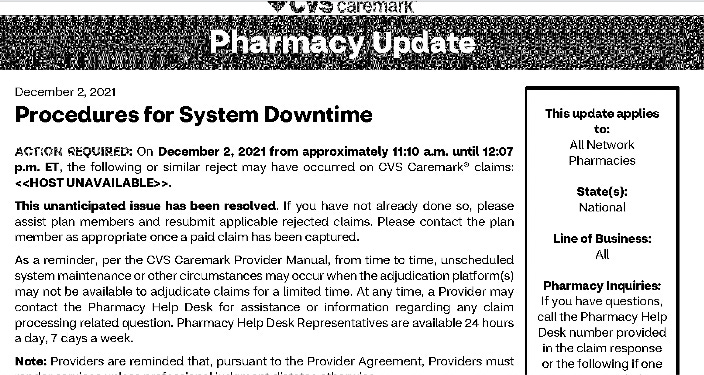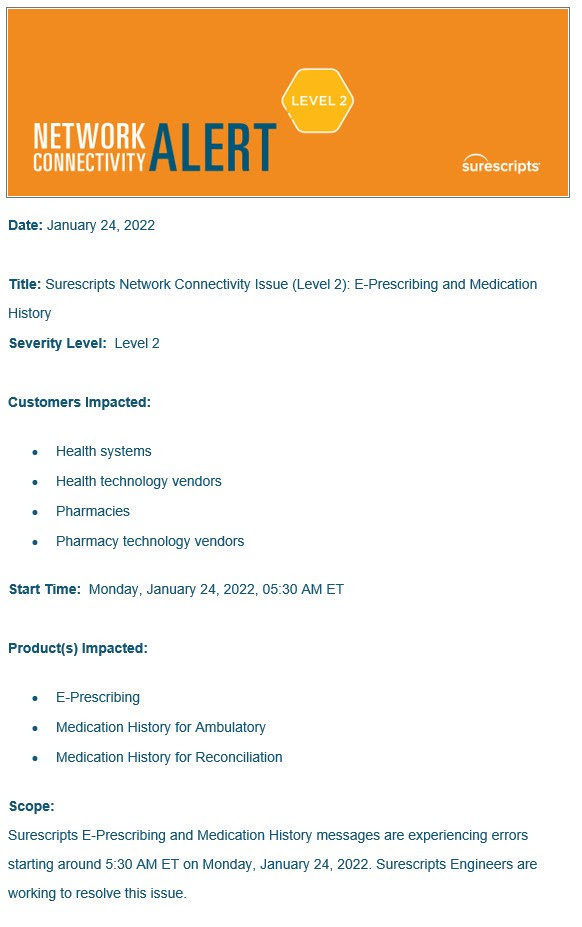Our Systems Are Down, So You Can't Have Your Medicine
Monopolies create costs that are almost impossible to measure. But they are very real.
Welcome to BIG, a newsletter on the politics of monopoly power. If you’d like to sign up to receive issues over email, you can do so here.
Back in November, I got prescribed some basic medicine, which I later learned wasn’t covered by my health insurer. As it turns out, it didn't matter because CVS's computer system was down, so the pharmacy couldn't dispense it to me anyway. I wasn’t feeling great, and the pharmacy was a madhouse. The pharmacist was apologizing sheepishly, telling people he couldn’t fill prescriptions and didn’t know when the system would come back online. People kept asking, and he kept shrugged. Some couldn’t speak English, and the situation was very confusing for them.
Meanwhile, there was an angry man sitting on the floor with a cast on his leg. He had been waiting there for an indefinite period of time. The pharmacist told him to leave and come back later because he wasn't sure when the system would come back. The guy was like "I physically can't come back, this is pain medication for a surgery I had today." And there was a tiny argument, but it was clear that everyone involved was powerless.
I bring this up because CVS is a massive company that has made the case that its mergers, like its purchase of Caremark and then Aetna, will help the firm become more efficient. The reality is that it is simply too big to manage. These downtimes are likely common. Here’s a notice in December of a national outage of the CVS Caremark claim system.
It’s not just CVS, of course, downtimes are common in industries with a lot of mergers like airlines or banks, which have a bunch of tangled IT systems that can’t easily be woven together. Monopolies make this situation much much worse, especially in the medical arena. Here’s a recent notice of downtime for Surescripts, which is right now being sued by the FTC for monopolizing the e-prescription market.
These kinds of downtimes can be a dangerous and confusing situation for patients. In a some states, it’s a requirement to send prescriptions electronically, (unless there’s downtime, but a lot of medical bureaucracies simply don’t know that anymore). So what will happen is that prescriptions won’t be written or will be delayed.
Anything that even temporarily disrupts the expected way that millions of people get their drugs is a small disaster. It’s not like doctors can just rewrite all the prescriptions for all the old people who are on 15 drugs immediately. And all the people most dependent on drugs are the least able to jump through hoops to get medicine and probably don’t know what medicines they’re on.
I don’t know what happened to that guy sitting on the floor, angry and in pain. I’m guessing he got his medicine eventually. There’s a chance he didn’t, and the situation got really bad for him, but he probably ended up fine. He’ll just trust the medical system a little less, and be a little less willing to trust our social institutions in general because of the pain they caused him. And that’s something you won’t find in any economic model explaining why CVS’s purchase of Caremark was a good idea.




I work at a place that does research using medical records and surescripts stopped sending prescriptions to a "health information exchange" (something designed to make it easy for different health IT systems to exchange information). I assume it was because there was a "dispute over costs" ... Like when a tv station and cable company fight it out over fees and you see stuff like "call blah blah blah now or you'll lose CBS!" ... Anyway, this can make it harder for doctors to see a patient's medication information (which is absolutely terrible) and it can make it harder for researchers to include medication information in their research (which has impacts far in the future).
To me, and I could be wrong, the surescripts situation probably calls for handcuffs for the executives who monopolized the market. It's not like they cornered the market on candy canes. They knew what they were doing and the impact it would have.
As for the systems, if it weren't monopolized, there'd be more incentive for the businesses to do a better job and focus more on making sure their systems were stable. Yeah, there will always be mistakes and systems will always go down. But, there would be a lot less if one company didn't run it all.
A part (just a part) of this problem is the following. Most programmers are not that good. Maybe 15% of them are in the top tier and that all work for big tech, startups, or Wall St. this is similar to Hollywood where there are a ton of directors, writers, and actors, but only a small subset are capable of creating a brilliant film.
And so, just like most output from Hollywood is mediocre or worse, most software systems are mediocre or worse. They eventually get hacked into a usable state but the system is brittle and substantial changes will break it.
And then, with an acquisition or merger, you now need to have these two fragile systems interconnected. And to make the interconnection work, you have two teams of mediocre programmers.
Of course these combined systems are going to fail.